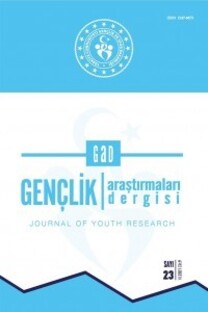Toplumsal Gelişme ve Toplumun Güçlendirilmesi Konusunda Gençliğin Katılımı Üzerine Yeniden Düşünmek
Gençlik katılımı toplumun gelişmesi ve vatandaşlık haklarının kullanımı bakımından önemli süreçlerdir. Bugüne kadar gençlik katılımının farklı konuları ve boyutları ile ilgili çok az çalışma yapılmıştır. Gençlik katılımı ve güçlendirilmesi kavramı üzerine değinen bu çalışma gençliğin hayatlarını etkileyecek konularda karar verme mekanizmalarına katılımının önemini tartışmaktadır. Gençlik karar verme mekanizmalarına katılabilme yetkinliğine sahiptir ve bu yetkinlik sıklıkla ebeveynler, öğretmenler ve diğer yetişkinler tarafından karar verme ve sorumluluk alma konularında yeterince yetkin olmadıkları gerekçesiyle reddedilmektedir. Bu çalışmanın amaçlarından biri gençlik katılımına yönelik bu kavramsallaştırmaların gençliğin bireyselliği için nasıl hayal kırıklığı yaratıcı olduğunu göstermektir. Çalışma gençlik katılımı konusunda bazı öneriler sunmaktadır. Bunlara ek olarak, toplumsal bilinç, eğitim, genç-yetişkin ilişkisinin güçlendirilmesi kavramlarının toplumsal kılıcılığın gelişmesi ve gücün dengelenmesi için temel süreçler olduğu belirtilmektedir
Anahtar Kelimeler:
Gençlik Katılımı, Güçlendirme, Toplumsal Bilinç, Eğitim, Kılıcılık, Yetişkin/Genç Ilişkisi, Toplumun Gelişimi
Rethinking Youth Participation For Social Development and Community Strengthening
Youth participation constitutes an essential process for promoting access to citizenship rights and particularly in terms of community development. So far, there has been little study in terms of youth participation in different matters and dimensions. Building on the notion of youth participation and empowerment, this paper tries to argue on the importance of youth involvement in the process of decision making regarding issues that affect their life. Young people are particularly capable of engaging in decision making processes, but this ability is often denied from parents, teachers, stakeholders or other adults because they often do not consider youth as being capable enough to be able to make decisions or take responsibility. One of the main objectives of this paper is to show how such conceptualizations towards youth participation can be very frustrating or detrimental towards their individuality. The paper proposes a few recommendations in regards to youth participation especially focusing on community engagement. In addition, social awareness, education and strengthening youth /adult relationships are central in the process of overcoming the imbalance of power and promoting agency
Keywords:
Youth Participation, Empowerment, Social Awareness, Education, Agency, Adult/Youth,
___
- • Bessant, J. (2003). Youth participation: a new mode of government. Policy studies, 24(2-3), 87-100.
- • Bronfenbrenner, U. (2005). Making human beings human: Bioecological perspectives on human devel- opment. Sage.
- • Coleman, J. S. (1974). Youth: Transition to adulthood. NASSP Bulletin, 58(385), 4-11.
- • Christens, B. D., & Dolan, T. (2011). Interweaving youth development, community development, and social change through youth organising. Youth & Society, 43(2), 528-548.
- • Driskell, D. (2002). Creating Better Cities with Children and Youth: A Manual for Participation. Stylus Publishing, 22883 Quicksilver Drive, Sterling, VA 20166-2012.
- • Duhn, I. (2006). Cartographies of childhood: Mapping the modern/global child (Doctoral dissertation, ResearchSpace@ Auckland).
- • Foucault, M. (1988). Technologies of the self. In L. H. Martin, H. Gutman & P. H. Hutton (Eds.), Technolo- gies of the self: a seminar with Michel Foucault (pp. 16-49). Amherst: University of Massachusetts Press.
- • Foucault, M. (1994a). Governmentality. In J. Faubion (Ed.), Michel Foucault: power. Essential works of Foucault 1954 - 1984(pp. 201-222). London: Penguin Books.
- • Ginwright, S., Cammarota, J., & Noguera, P. (2006). Beyond resistance . Routledge Taylor & Francis Group.
- • Irwin, S. (2013). Rights of passage: Social change and the transition from youth to adulthood (Vol. 4). Routledge.
- • Lansdown, G. (2001). Promoting children’s participation in democratic decision-making. Florence, Italy: Innocenti Research Center, UNICEF.
- • Lerner, R. M., Lerner, J. V., Almerigi, J. B., Theokas, C., Phelps, E., Gestsdottir, S., ... & Smith, L. M. (2005). Positive youth development, participation in community youth development programs, and com- munity contributions of fifth-grade adolescents: Findings from the first wave of the 4-H study of positive youth development. The Journal of Early Adolescence, 25(1), 17-71.
- • Liebel, M. (2007). Paternalism, participation and children’s protagonism. Children, Youth and Environ- ments 172: 56–73.
- • Mahoney, J. L., Harris, A. L., & Eccles, J. S. (2006). Organised Activity Participation, Positive Youth De- velopment, and the Over-Scheduling Hypothesis. Social Policy Report. Volume 20, Number 4. Society for Research in Child Development.
- • Park, N. (2004). The role of subjective well-being in positive youth development. The Annals of the Amer- ican Academy of Political and Social Science, 591(1), 25-39.
- • Shier, H. (2009) ‘Children as Public Actors: Navigating the Tensions’. Children and Society (online early view, published January 2009)(Last accessed 25 June, 2009).
- • Skivenes, M.and Strandbu, A. (2006). A child perspective and children’s participation. Children, Youth and Environments, 16(2): 10–27.
- • Wallerstein, N., & Bernstein, E. (1988). Empowerment education: Freire’s ideas adapted to health educa- tion. Health Education & Behavior, 15(4), 379-394.
- • Wang, C. C. (2006). Youth participation in photovoice as a strategy for community change. Journal of community practice, 14(1-2), 147-161. • Other resources
- • Convention on the Rights of the Child (CRC) (1989). http://www.ohchr.org/EN/ProfessionalInterest/Pag- es/CRC.aspx Consulted on 13.05.2017
- • What do we mean by youth? Learning to live together - UNESCO http://www.unesco.org/new/en/so- cial-and-human-sciences/themes/youth/youth-definition/ Consulted on 13.05.2017
- • UNICEF. (2003). For Every Child Health, Education, Equality, Protection. UNICEF report. https://www. unicef.org/sowc03/contents/pdf/SOWC03-eng.pdf Consulted on 13.05.2017
- ISSN: 2147-8473
- Yayın Aralığı: Yılda 3 Sayı
- Başlangıç: 2012
- Yayıncı: T.C. Gençlik ve Spor Bakanlığı Eğitim, Kültür ve Araştırma genel Müdürlüğü
Sayıdaki Diğer Makaleler
Özel Yetenekli Öğrencilerin Yeni Medya Kullanımları ve Akademik Başarılarına Etkisi
Fransa’da Yurttaşlık Eğitimi ve Gençlik
M Tuğba ERDEM, Aylin Görgün BARAN
Aylin YALÇIN IRMAK, Meryem METİNOĞLU
Rethinking Youth Participation For Social Development and Community Strengthening
A Research About the Youngs’ Voting Behavior in Local Elections: Metropolitan Municipality Election
